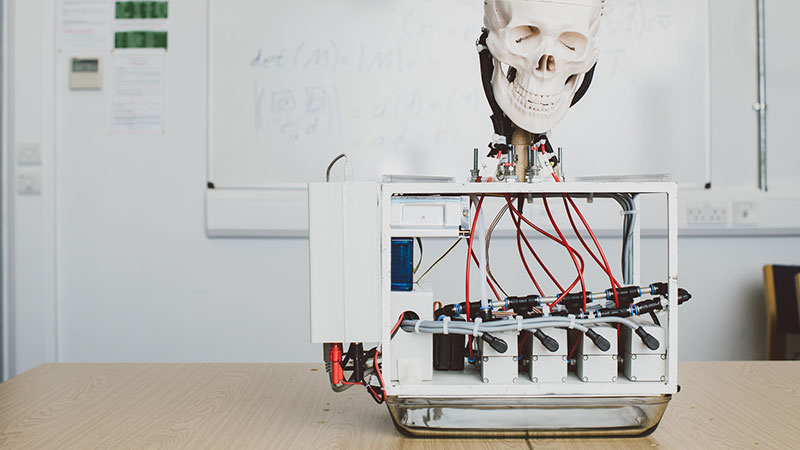Artificial Intelligence
MSc or PGDip or PGCert
Start dates: September 2026
Full time: Full time: MSc - 1 year (12 months); PG Dip - 6 months; PG Cert - 3 months
Part time: Part time: MSc - 2 years (24 months); PG Dip - 18 months (12 months study time); PG Cert - 6 months
Location: Headington
Overview
Are you ready to be part of the Artificial Intelligence (AI) revolution and shape the future of technology? Study MSc Artificial Intelligence at Oxford Brookes and you’ll get to grips with current AI trends like autonomous vehicles and augmented reality.
Ignite your imagination as you study with researchers and tutors at the forefront of AI. You’ll build on your existing knowledge of machine learning, discover how AI integrates with big data and the cloud, and untangle the algorithms behind intelligent autonomous systems and cloud computing.
We encourage you to take part in our research. You can help our robot dog navigate obstacles or join the Oxford Brookes winning Formula Student autonomous vehicle team. You’ll also have the chance to get hands-on in the Robot Lab where you’ll complete coursework.
As one of our MSc Artificial Intelligence students, you’ll bring extensive knowledge of software development, and you may already have industry experience. You’ll be ready to create new AI tools.

Why Oxford Brookes University?
-
New State-of-the-art facilities
All Computing courses are based in new, custom designed buildings at our main Headington site. You'll benefit from state-of-the-art facilities and equipment including a VR cave, digital, computing and robotics labs, as well as social learning spaces, teaching rooms and cafe space.
-
Formula Student racing
Develop software for autonomous vehicles as part of a winning Formula Student racing team.
-
Current AI trends
Discover how AI is changing industry, explore AI systems and work with industrial robotics.
-
Award-winning research
Our department is home to a team of world-leading researchers with a focus on user-inspired original research with real-world applications.
-
Tech industry hub
Oxford is proportionally the third-largest digital cluster in the country with 25% of employment coming from the tech industry.
Course details
Study modules
The modules listed below are for the master's award. For the PGDip and PGCert awards your module choices may be different. Please contact us for more details.
Please note: As our courses are reviewed regularly as part of our quality assurance framework, the modules you can choose from may vary from those shown here. The structure of the course may also mean some modules are not available to you.
Research
The School of Engineering, Computing and Mathematics is home to world-leading and award-winning research. Our focus is on user-inspired original research with real-world applications.
We have a vibrant and growing research community, with a wide range of activities from model-driven system design and empirical software engineering through to web technologies, cloud computing and big data, digital forensics and computer vision.
Staff and students collaborate on projects supported by the EPSRC, the EU, the DTI, and several major UK companies.
Computing achieved an excellent assessment of its UoA (Unit of Assessment) 11 return for REF 2014 (Research Excellence Framework).
Students on this course can be involved with research in the following research groups:
Careers
Our course equips you with the skills and knowledge to pursue a challenging career. It can open doors to roles in AI software engineering, further study and careers in other industries where an understanding of this area is key.
A particular feature at Oxford Brookes is our in-house research where postgraduate students can gain hands-on experience at the cutting edge of the AI industry. Pursue your interests and increase your employability in a niche AI field from ethics to vision to vehicles. Our current research groups include the Formula Student team and:
Entry requirements
Specific entry requirements
To join this course you'll need a 2:2 bachelor's degree in computing, maths, engineering or a science-related subject, in which good programming skills have been developed. Those without a degree in these areas, but who have worked in a related industry, and have good relevant experience and programming skills, can also apply.
If you have no experience or degree in a computing related discipline you should consider our MSc in Computing Science.
For the Postgraduate Certificate Research Project you should provide evidence of experience in research and study methods.
Please also see the University's general entry requirements.
English language requirements
If your first language is not English you will require a minimum IELTS score of 6.0 with 6.0 in all components.
OR
An equivalent English language qualification acceptable to the University.
Please also see the University's standard English language requirements.
Pathways courses for international and EU students
We offer a range of courses to help you meet the entry requirements for your postgraduate course and also familiarise you with university life in the UK.
Take a Pre-Master's course to develop your subject knowledge, study skills and academic language level in preparation for your master's course.
If you need to improve your English language, we offer pre-sessional English language courses to help you meet the English language requirements of your chosen master’s course.
English requirements for visas
If you need a student visa to enter the UK you will need to meet the UK Visas and Immigration minimum language requirements as well as the University's requirements. Find out more about English language requirements.
Terms and conditions of enrolment
When you accept our offer, you agree to the Terms and Conditions of Enrolment. You should therefore read those conditions before accepting the offer.
International qualifications and equivalences
How to apply
Application process
Tuition fees
Questions about fees?
Contact Student Finance on:
Tuition fees
The following factors will be taken into account by the University when it is setting the annual fees: inflationary measures such as the retail price indices, projected increases in University costs, changes in the level of funding received from Government sources, admissions statistics and access considerations including the availability of student support.
How and when to pay
Tuition fee instalments for the semester are due by the Monday of week 1 of each semester. Students are not liable for full fees for that semester if they leave before week 4. If the leaving date is after week 4, full fees for the semester are payable.
- For information on payment methods please see our Make a Payment page.
- For information about refunds please visit our Refund policy page
Additional costs
Please be aware that some courses will involve some additional costs that are not covered by your fees. Specific additional costs for this course are detailed below.
Optional costs
| Additional costs | Amount (£) |
|---|---|
| Travel and associated costs if relevant when undertaking work placements. | £30-700 per year |
If you are considering bringing your own computer, most of the software we use is on Windows machines though there is some use of Linux. We do not use Apple MacOS and their use is not required but some students do choose to bring MacOS machines so a Mac can be a viable choice if you so wish.
|
£500-1200 |
It’s your responsibility to cover print / binding costs where coursework submission is required. Please note that a lot of the coursework is now submitted online. |
From £30 |
| You may choose to purchase books to support your studies. Many books on our reading lists are available via the Library, or can be purchased secondhand. | £20-60 per book |
Accommodation fees in Brookes Letting (most do not include bills) |
£107-301 per week |
Accommodation fees in university halls (bills included, excluding laundry costs) |
£139-248 per week |
Graduation costs include tickets, gowning and photography. Gowns are not compulsory but typically students do hire robes, starting at £41. |
Typically £0-200 |
Students are responsible for their own travel to and from university for classes. For the 2025/26 academic year, the University is introducing an alternative subsidised travel offer for all students with further information on our Travel webpages. |
From £10 |
Funding your studies
Financial support and scholarships
Featured funding opportunities available for this course.
The Department of Computing and Communication Technologies awards a limited number of scholarships for its taught postgraduate programmes, which are awarded on a competitive basis to UK, EU and international postgraduates each year.
All financial support and scholarships
Programme changes:
On rare occasions we may need to make changes to our course programmes after they have been
published on the website. For more information, please visit our
changes to programmes page.

